-
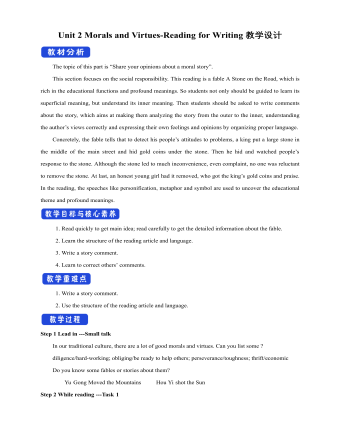
新人教版高中英语必修3Unit 2 Morals and Virtues-Reading for Writing教学设计
1. 这个寓言是一个关于一位国王古寓言。 The fable is an old fable about a king.2.作者用这个故事让读者对于社区的问题负有个人责任的必要印象深刻。The author used the story to impress upon readers with the need to take personal responsibility for problems in the community.3. 这个故事十分成功的实现了它的目的。The story was quite successful in achieving its purpose.Step 7 WritingPlease write a review of the story according the outline above.The fable is an old fable about a king who thought his people are lazy, so he put a large stone in the middle of the road and hides and waited to see if anyone will try to move it.The author used this story to impress upon readers with the need to take personal responsibility for problems in the community. The story was quite successful in achieving its purpose, and I liked it because it had a clear moral.However, while the moral of the story is clear, the actions of the king seemed pointless to me, because none of the characters in the story learnt anything. For this reason, I think there are better stories that can be used to impress upon people with the need for personal responsibility.Step 8 Pair workExchange drafts with a partner. Use this checklist to help your partner revise his/her draft.1. Does the writer give a short description of the story ?2. Does the description include the most important details of the story ?3. Does the writer give his or her opinion about the character or their actions ?4. Is the review well-organised ? 5. Does the writer use the -ing form as the adverbial correctly in the writing ?6. Are there any grammar, spelling, or punctuation errors ?Step 9 HomeworkPut up your revised draft in the classroom or read it to your class.
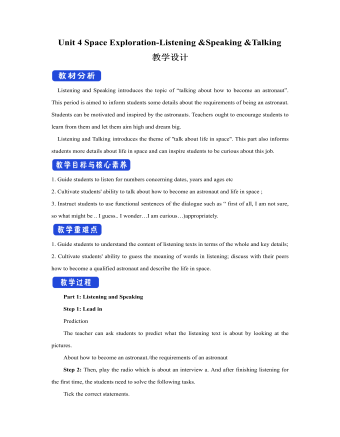
新人教版高中英语必修3Unit 4 Space Exploration-Listening&Speaking&Talking教学设计一
Listening and Speaking introduces the topic of “talking about how to become an astronaut”. This period is aimed to inform students some details about the requirements of being an astronaut. Students can be motivated and inspired by the astronauts. Teachers ought to encourage students to learn from them and let them aim high and dream big.Listening and Talking introduces the theme of "talk about life in space". This part also informs students more details about life in space and can inspire students to be curious about this job. 1. Guide students to listen for numbers concerning dates, years and ages etc2. Cultivate students' ability to talk about how to become an astronaut and life in space ; 3. Instruct students to use functional sentences of the dialogue such as “ first of all, I am not sure, so what might be .. I guess.. I wonder…I am curious…)appropriately.1. Guide students to understand the content of listening texts in terms of the whole and key details; 2. Cultivate students' ability to guess the meaning of words in listening; discuss with their peers how to become a qualified astronaut and describe the life in space.Part 1: Listening and SpeakingStep 1: Lead inPredictionThe teacher can ask students to predict what the listening text is about by looking at the pictures.About how to become an astronaut./the requirements of an astronautStep 2: Then, play the radio which is about an interview a. And after finishing listening for the first time, the students need to solve the following tasks.
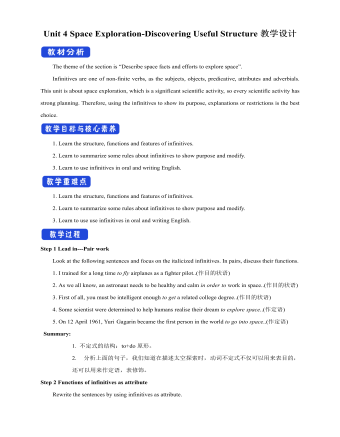
新人教版高中英语必修3Unit 4 Space Exploration-Discovering Useful Structure教学设计
The theme of the section is “Describe space facts and efforts to explore space”. Infinitives are one of non-finite verbs, as the subjects, objects, predicative, attributes and adverbials. This unit is about space exploration, which is a significant scientific activity, so every scientific activity has strong planning. Therefore, using the infinitives to show its purpose, explanations or restrictions is the best choice.1. Learn the structure, functions and features of infinitives.2. Learn to summarize some rules about infinitives to show purpose and modify.3. Learn to use infinitives in oral and writing English. 1. Learn the structure, functions and features of infinitives.2. Learn to summarize some rules about infinitives to show purpose and modify.3. Learn to use use infinitives in oral and writing English.Step 1 Lead in---Pair workLook at the following sentences and focus on the italicized infinitives. In pairs, discuss their functions. 1. I trained for a long time to fly airplanes as a fighter pilot..(作目的状语)2. As we all know, an astronaut needs to be healthy and calm in order to work in space..(作目的状语)3. First of all, you must be intelligent enough to get a related college degree..(作目的状语)4. Some scientist were determined to help humans realise their dream to explore space..(作定语)5. On 12 April 1961, Yuri Gagarin became the first person in the world to go into space..(作定语)Summary:1. 不定式的结构:to+do原形。2. 分析上面的句子,我们知道在描述太空探索时,动词不定式不仅可以用来表目的,还可以用来作定语,表修饰。
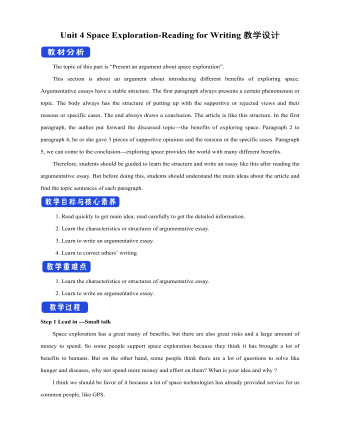
新人教版高中英语必修3Unit 4 Space Exploration-Reading for Writing教学设计二
⑦在我看来, 探索太空是值得的。As far as I am concerned, it is worthwhile to explore the space.Step 10 Writing---draftRecently, students in our class have had heated a discussion on whether space is worth exploring. Students hold different ideas about it.30% of us think space exploration is not worthwhile. They think space is too far away from us and our daily life and is a waste of money. And the money spent on space exploration can be used to solve the earth’s problems such as starvation and pollution.On the other hand,70% think space is worth exploring because we have benefited a lot from it,such as using satellites for communication and weather forecast. What’s more,with further space research,we may solve the population problem by moving to other planets one day. Also,space research will enable us to find new sources to solve the problem of energy shortages on the earth.As far as I am concerned, it is worthwhile to explore the space. Not only can it promote the development of society but also enrich our life. Step 11 Pair workExchange drafts with a partner. Use this checklist to help your partner revise his/her draft.1.Does the writer explain why he/she changed/wanted to change?2.Does the writer tell how the changes have improved or will improve his/her life?3.Is the text well-organised?4.Does the writer use words and expressions to show similarities and differences?5.Are there any grammar or spelling errors?6.Does the writer use correct punctuation?
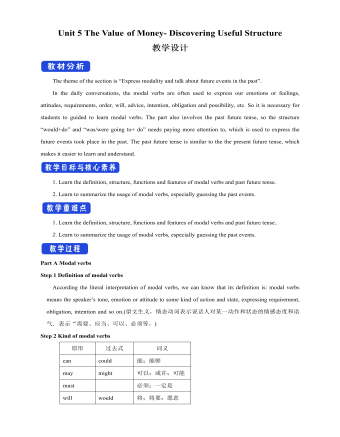
新人教版高中英语必修3Unit 5 The Value of Money- Discovering Useful Structure教学设计
Step 3 Meaning1. 过去将来时表示从过去某一时间来看将要发生的动作或存在的状态, 常用在宾语从句中。一般由“would/should +动词原形”构成。She hoped that they would meet again someday. 她希望将来有一天他们能再见面。2. was/were going to+动词原形: 表示过去将要发生或很有可能发生的动作, 常用于口语中, 表示预言、意图或者打算等。He was going to start work the following week. 他打算下星期开始工作。3. was/were about to do: 常用来表示即将发生的动作, “刚要/正要做……”。注意该结构不与任何时间状语连用。I felt that something terrible was about to happen. 我感到某种可怕的事情即将发生。4.was/were to do: 表示“曾计划做某事”, 如果表示“本来计划做某事, 动作没实现”, 则需用 “was/were to have done”。She said she was to have told me about the accident. 她说她本来想告诉我关于事故的事。5.Start, go, come, leave, see, meet等动词的过去进行时: 表示就过去某一时刻而言即将发生的动作。She was coming later. 她随后就来。I had just put on my overcoat and was leaving to visit a friend of mine. 我刚穿上外套要去看我的一个朋友。
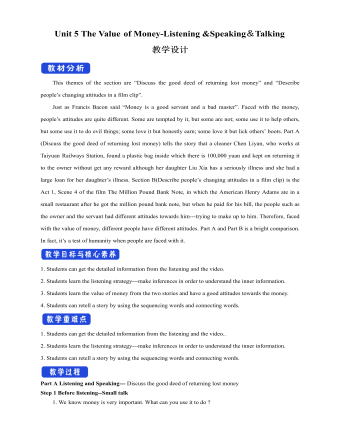
新人教版高中英语必修3Unit 5 The Value of Money-Listening &Speaking&Talking教学设计
4. A:We’d like to have someone to say a word at the beginning to welcome the group.B:↙Who?A:We thought that you or Dr.Johnson might do it.B用降调说Who,其意思是问,对方想让谁在开场时致欢迎词。Step 6 Pronunciation---Practice1. Listen to the short conversation and mark the intonation with ↗, ↙ or ↙, ↗. Then discuss with a partner what they intend to convey by using different intonation.Owner: You know what ?↗ It’s a million-pound bank note↙.Waiter 1: Really ?↗(question)Waiter 2: Really !↙(unbelievable and surprised)Waiter 3: Really ?!↙↗(first question then surprised)2. Listen to the conversations. Underline the parts that are stressed and mark the intonation. Then talk about the implied meanings of the responses with different intonations. Listen again and repeat.1) Henry: It’s a nice suit.Owner: Oh, it’s perfect!↙(The intonation means it is very suitable for Henry.)2) Henry: Well, that’s very kind of you.Owner: Kind, sir ?↗(what you said is not right) No, it’s kind of you. You must come whenever you want and have whatever you like. Just having you sit here is a great honour !!↙(welcome you to come again)3)Henry:Well, to be honest, I have none. Oliver:(happily) What luck!(excited) Brother↗, what luck!↙(It means “Didn’t you hear it?”)Henry: Well, it may seem lucky to you but not to me!↗(angry) If this is your idea of some kind of joke, I don’t think it’s very funny. Now if you’ll excuse me, I ought to be on my way.↙(If so, I would leave.)Roderick: Please don’t go↙...(hope Henry can wait for a moment)Part B Viewing and Talking---Describe people’s changing attitudes in a film clipStep 1 Before-listening---Tell the filmYou are going to watch part of the film The Million Pound Bank Note. Look at these photos and guess what happens in the film.
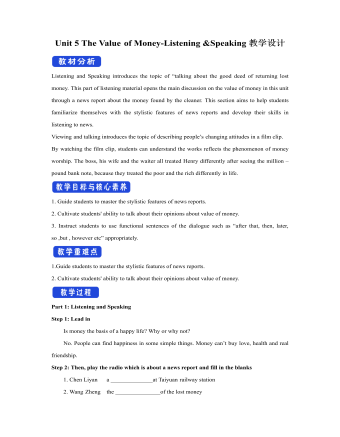
新人教版高中英语必修3Unit 5 The Value of Money-Listening &Speaking教学设计
Step 4: Listen again and decide if the following statements are true (T) or false (F).1 It was the first time Chen Liyan's story was reported. T口 F口2 Chen found 10,000 yuan in a small plastic bag in Taiyuan railway station口 F口3 Wang Zheng apologized to Chen because he couldn't offer her more money. T口 F口4 Chen took out a large loan to cure her daughter, T口 F口5 Wang set up a fundraising website for Chen's daughter after Chen told him about her situation. T口 F口Step 5:After listening, discuss the questions.1 What kind of person do you think Chen Liyan is?Chen Liyan is generous and honest because she returned a large sum of money to the owner.2 Did Chen return the money because she didn't need it?No. She returned the money because it was the right thing to do. Evidence for this is that she refused to accept the reward money because she felt that it had not been earned. 3 Is it common for people to do what Chen did?It depends on the culture. In some countries it is quite common to return money that has been found. In other countries, people believe "Finders are keepers!" 4 How did Wang Zheng feel about the return of his money?He must have been very happy and relieved to have gotten his money back. We know this because he thanked Chen repeatedly and even offered her a reward.5 Why did Ma Dongbao tell Wang about Chen's family?He must have had great sympathy for Chen and her daughter and wanted to help them.'We know this because he arranged help for them. 6 How did the news reporter feel about Chen's actions?The news reporter felt that it showed that money wasn't the most important thing in life. We know this because the reporter told us that this is what Chen believes. and then said, “that's a great attitude to take."
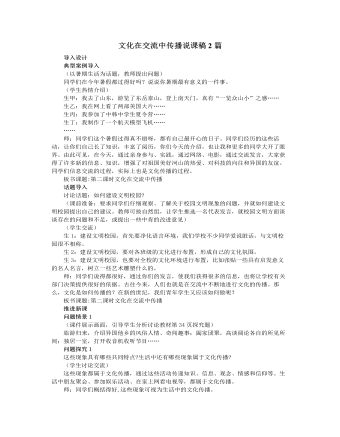
人教版高中政治必修3文化在交流中传播说课稿2篇
师:同学们这个暑假过得真不错呀,都有自己最开心的日子。同学们经历的这些活动,让你们自己长了知识,丰富了阅历,你们今天的介绍,也让我和更多的同学大开了眼界。由此可见,在今天,通过亲身参与、实践,通过网络、电影,通过交流发言,大家获得了许多新的信息、知识,增强了对祖国美好河山的热爱、对科技的向往和异国的友谊。同学们信息交流的过程,实际上也是文化传播的过程。板书课题:第二课时文化在交流中传播话题导入讨论话题:如何建设文明校园?(课前准备:要求同学们仔细观察、了解关于校园文明现象的问题,并就如何建设文明校园提出自己的建议。教师可按自然组,让学生推选一名代表发言,就校园文明方面谈谈存在的问题和不足,或提出一些中肯的改进意见)(学生交流)生1:建设文明校园,首先要净化语言环境,我们学校不少同学爱说脏话,与文明校园很不相称。
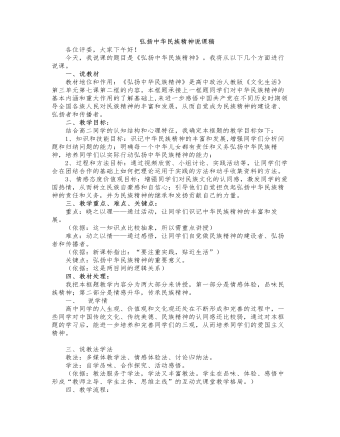
人教版高中政治必修3弘扬中华民族精神说课稿
3、评:以评促行。(6分钟)高中生的年龄特点决定了他们非常重视别人对自己的评价,渴望得到他人的肯定与鼓励。(所以我在班上组织一个活动:让同学们评选出班上“讲文明懂礼貌的文明之星”、“勤思考善创新的学习之星”(先让同学推举大家都认同的4位同学,然后对他们进行投票,投票结果将在下堂课上公布)以此活动来激发同学们用实际行动做民族精神的践行者和传播者。)4、唱:以情激行。(2分钟)在课程内容讲授结完毕后,组织全班同学跟着音乐高唱孙楠的《红旗飘飘》,生化情感,激发同学们的爱国情感。五、课堂拓展(请同学们各展才华:课后让同学们各自准备一个项目以体现民族精神。(项目形式是:或作文、书画;或剪纸、或歌曲小品)……让同学们用实际行动祝愿我们伟大的祖国更加繁荣昌盛!让我们的民族精神代代相传!)
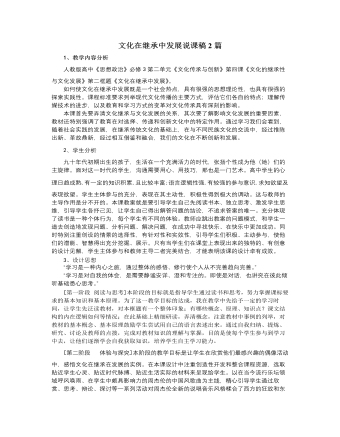
人教版高中政治必修3文化在继承中发展说课稿2篇
2、学生分析 九十年代初期出生的孩子,生活在一个充满活力的时代,张扬个性成为他(她)们的主旋律。面对这一时代的学生,沟通需要用心、用技巧,那也是一门艺术。高中学生的心理日趋成熟,有一定的知识积累,且比较丰富;语言逻辑性强,有较强的参与意识,求知欲望及表现欲望。学生主体参与的充分,表现在其主动性,积极性得到极大的调动。这与教师的主导作用是分不开的。本课教案就是要引导学生自己先阅读书本、独立思考、激发学生思维,引导学生各抒己见,让学生自己得出解答问题的结论,不追求答案的唯一。充分体现了读书是一种个体行为,每个学生有不同的体验。教师应跳出教案的问题模式,和学生一道去创造地发现问题、分析问题、解决问题,在成功中寻找快乐、在快乐中更加成功。同时特别注重创设的情景的选择性,有针对性和实效性,引导学生们积极、主动参与,使他们的潜能、智慧得出充分挖掘、展示。只有当学生们在课堂上表现出来的独特的、有创意的设计见解,学生主体参与和教师主导二者完美结合,才能表明该课的设计卓有成效。
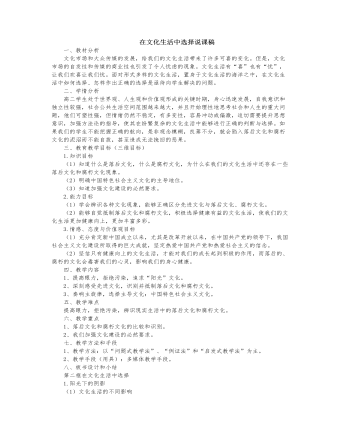
人教版高中政治必修3在文化生活中选择说课稿
一、教材分析文化市场和大众传媒的发展,给我们的文化生活带来了许多可喜的变化。但是,文化市场的自发性和传媒的商业性也引发了令人忧虑的现象。文化生活有“喜”也有“忧”,让我们欢喜让我们忧。面对形式多样的文化生活,置身于文化生活的海洋之中,在文化生活中如何选择、怎样作出正确的选择是亟待向学生解决的问题。二、学情分析高二学生处于世界观、人生观和价值观形成的关键时期,身心迅速发展,自我意识和独立性较强,社会公共生活空间范围越来越大,并且开始理性地思考社会和人生的重大问题,他们可塑性强,但情绪仍然不稳定,有多变性,容易冲动或偏激,迫切需要提升思想意识,加强方法论的指导,使其在纷繁复杂的文化生活中能够进行正确的判断与选择。如果我们的学生不能把握正确的航向,是非观念模糊,良莠不分,就会陷入落后文化和腐朽文化的泥沼而不能自拔,甚至造成无法挽回的恶果。
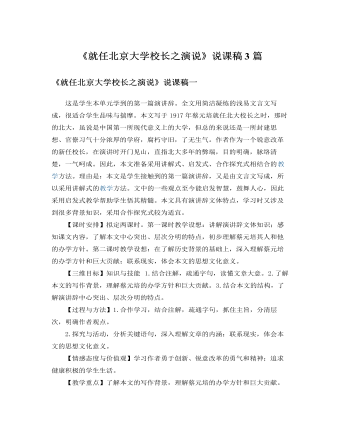
人教版高中语文必修2《就任北京大学校长之演说》说课稿3篇
(三)教学重、难点1、教学重点:结合课文,了解演讲辞针对性强、条理清楚、通俗易懂、适当的感情色彩等特点。2、教学难点:深入理解文章内涵,联系现实,体会本文的现实意义二、说学情高中学生在初中阶段已经接触过演讲辞了,对演讲词的特点已经有了一些基本的知识,因此本轮的教学应该让他们在此基础上有所提高。本文是学生在高中阶段第一次接触演讲辞,有必要让他们了解演讲辞的特点及课文如何体现这些特点的。随着年龄的增长,生活阅历的增加,高中学生正逐渐形成自己对世界、对人生的看法,蔡元培先生的这篇文章能很好地激发他们对当前的高中学习和未来的大学生活进行思考。此外,学生对北大的历史及蔡元培先生作这番演讲的时代背景了解不深,应作出补充说明。
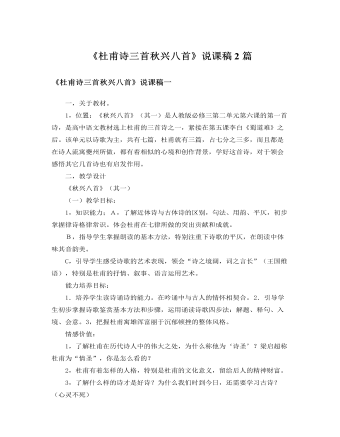
人教版高中语文必修3《杜甫诗三首 秋兴八首》说课稿2篇
师:“两开”是什么意思啊?注解里是怎么说的?第二次开,也就说他在这个地方已经待了两年了,这里是他回家的路途中,是不是?路途中他停留了两年时间。好的,你先请坐。你觉得残菊不能两开,在理解上好像存在一些误差。赵勇:因为菊花古往今来代表着对家乡的思念。师:菊花代表对家乡的思念?(下面学生齐笑)这种说法牵强了些,菊花在古代象征着高洁,梅兰竹菊是四君子嘛。赵勇:写这首诗时,他已经打算回故乡了,所以不应该写“残菊”,写“残菊”的话……师:事实上,他回不了故乡。好的,请坐。再想想,“残菊”意味着什么?破败。“丛菊”呢?茂盛。那这里说“两开他日泪”,“两开”是什么意思?开了两了次了,这说明他在这里已经待了两年了。那“他日泪”又是什么意思?赵勇:应该是他看到这里的菊花开得这么茂盛,就想到了故乡的菊花也是开的茂盛的时候。如果是“残菊”的话,那故乡的菊也会开得很残败。(下面学生齐笑)
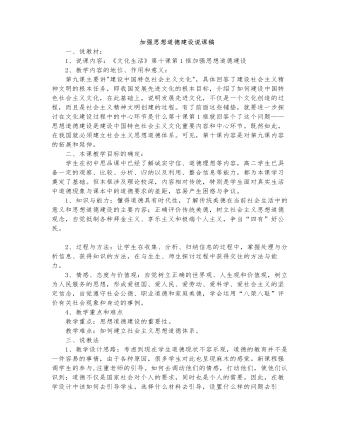
人教版高中政治必修3加强思想道德建设说课稿
【讨论】只要继承和弘扬中国传统文化中传统美德,就可以构建思想道德体系。学生展示:法律中道德规范。老师展示:法治:以法律的权威性和强制性规范社会成员的行为(外律)。德治:以道德的说服力和感召力提高社会成员的思想认识和道德觉悟(内律)。结论:既要加强社会主义法制建设,依法治国;也要继承、发展、创新传统美德,加强思想道德建设,以德治国。建立社会主义思想道德体系要与法律法规相协调。设计意图:设计一个条件型辨析探究题开展讨论,把建设思想道德与优秀传统文竹也、法治的关系结合起来,把课堂探究与课前探究结合起来,有利于提高学生的思维能力和课堂教学效率。践行:思想道德建设从我做起你是否认同、选择下列行为?展示校园现象图片《作弊》与《小烟民》(略);展示中学生在家中表现的漫画《老子、儿子和孙子》(略);
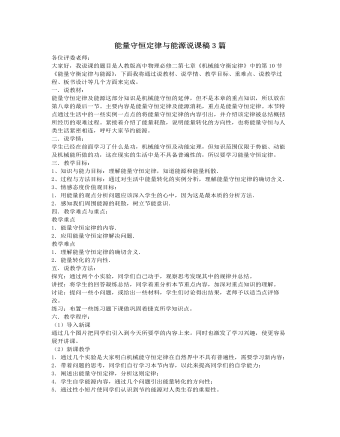
人教版新课标高中物理必修2能量守恒定律与能源说课稿3篇
(3)内陆和中西部城镇主要以煤和火电为主;广大农村和边远地区大多正从使用农作物秸秆等生物能源。(4)人均能源资源不足。我国是世界第三大能源生产国和第二大能源消费国,而我国能源短缺,特别是油气资源短缺已成为制约我国经济发展的重要因素。相关数据——煤炭、石油和天然气的人均资源占有量只有95t,世界平均值为209t,约是世界人均值的1/2;我国人均石油可采储量3t,世界平均值为28t,约为世界平均值的1/10。我国人均能源消费量不足1.2吨标准煤,居世界89位,不足世界人均能源消费水平的一半,仅占发达国家的1/5~1/10。其中人均消费650kg标准煤,是世界平均额的95%;人均消费石油相当145kg标准煤,为世界平均数的16.8%;人均消费天然气相当17.7kg标准煤,为世界平均数的3.9%;人均消费电力501.5kWh,为世界平均水平的25%。(5)是能源消费结构不合理,突出存在着一低两高:即电能消费比例低,非商品生物能源消费量高,一次性商品能源消费中原煤消费比重高。原煤消费达到75%,远高于26.2%的世界平均水平。
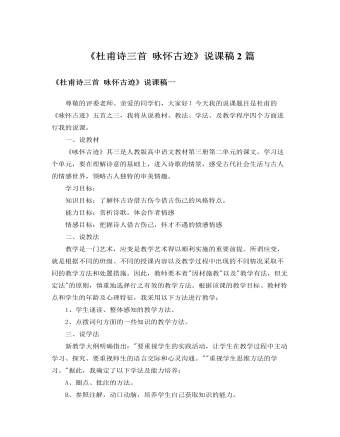
人教版高中语文必修3《杜甫诗三首 咏怀古迹》说课稿2篇
第三,说教学重点和难点。根据课程标准的具体要求、学生实际和社会实际以及教材的逻辑结构和教学体系,我认为本课的重难点是以下几个方面。教学重点:1.理解王昭君的形象2.深入理解杜甫在诗中的情感教学难点:理解寓意,把握主旨。第四,说教法与学法。教法:根据课文特点和学生实际情况,以诵读法(示范朗读、学生齐读)、问题探究法、点拨法、讨论分析法进行教学。首先激发学生学习本文的兴趣;然后引导学生反复吟哦诵读,在读的过程中质疑、思考、品析、鉴赏;最后在教师适当的点拨下,在集体的热烈讨论中,理解作者的感情,得到新的认识。(解说:使学生在教师的主导下围绕中心议题发表各自的意见,相互交流,相互启发,相互争议,激发他们主动去获取知识,培养健康情感。)
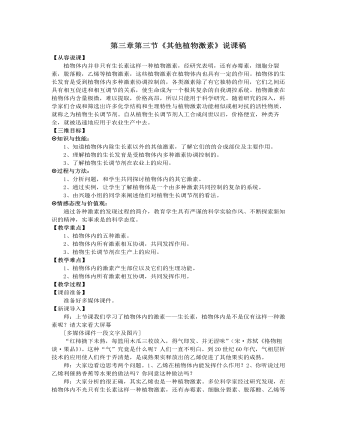
人教版高中生物必修3第三章第三节《其他植物激素》说课稿
二、应用生长调节剂的注意事项1、效果不稳定。2、使用时期。3、使用浓度和方法。4、使用生长调节剂仅是葡萄栽培管理的辅助手段,不能盲目孤立地依赖生长调节剂。生2:我们小组查的资料是关于小麦使用生长调节剂。小麦应用植物生长调节剂,可以调节植株的生长发育,具有控旺促壮、增强抗逆性、增加粒重、提高产量并有利于优质、早熟等多重效果。生3:我找了一篇生长调节剂对矮牵牛大型穴盘生产。师:上面三位同学利用课下的时间,在网上查的三段文字都相当的不错,大家可以从中学到一些书本上没有的知识,请大家结合刚刚三位同学的三段文字以及自己平时所积累的知识,讨论以下几个问题。师:你知道哪些农产品在生产过程中使用了植物生长调节剂?师:哪些水果在上市前有可能使用了乙烯利?师:生产过程中施用植物生长调节剂,会不会影响农产品的品质?师:如果你是水果销售员,面对半青不熟的水果,你认为应当使用乙烯利催熟吗?作为一个消费者,你又怎么看?
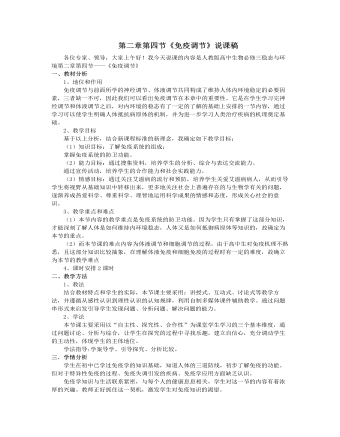
人教版高中生物必修3第二章第四节《免疫调节》说课稿
(四)、活动交流,体验科学通过资料分析讨论以下三个问题:1、你知道爱滋病的传播途径吗?2、如何预防爱滋病?3、我们应如何对待爱滋病患者?面对艾滋病我们能做些什么?从而进入情感态度的教育。除此之外,我还设计一个开放性的作业“向全社会为关注艾滋病设计一个宣传广告”(形式不限,漫画、板书、倡议书等),让学生把爱心付诸于实际行动。在此基础上引出“免疫学的应用”从免疫预防、免疫治疗、器官移植三个方面讲述,让学生充分体验到知识和社会生活的紧密联系,让他们不在感到科学是那么的遥远,而是可爱的有用的。通过交流,让同学们体会到合作的魅力和重要性,进一步培养合作意识和合作能力。最后我设计一个资料搜集,让同学们选一个感兴趣的主题利用电脑在网上搜集有关资料。主题:1、你知道世界艾滋病日吗?历年的主题是什么?开展世界艾滋病运动有什么意义?
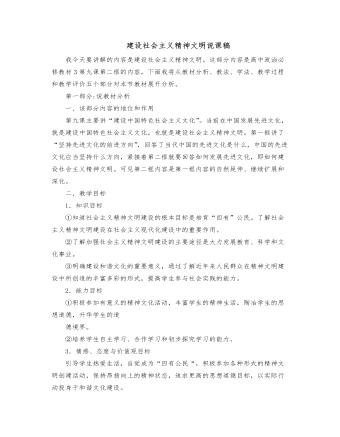
人教版高中政治必修3建设社会主义精神文明说课稿
最后,教师对这节课学习的内容做回顾总结,并让学生做几道练习题巩固一下新知识。依据:本节课主要是通过学生对关中文化的了解来学习我国的传统文化。所以我计划通过3-5分钟的设问导课让学生把注意力转变集中到课堂中,引导学生关注课堂。整体时间安排符合教育学中的最佳时间分配原理和反馈原理。这样做也有利于优化课堂结构、提高教学效率、把主要时间留给学生,把主动权还给学生。针对高三年级学生的层次差异,我进行了分层设置,设置有基础题和拔高题。这样做既可以使学生掌握基础知识,又可以使学有余力的学生有所提高,从而达到拔尖和“减负”的目的。板书设计板书就是微型教案,板书集中体现教学的三维目标、重难点、教学过程,体现教学的特色与特性。
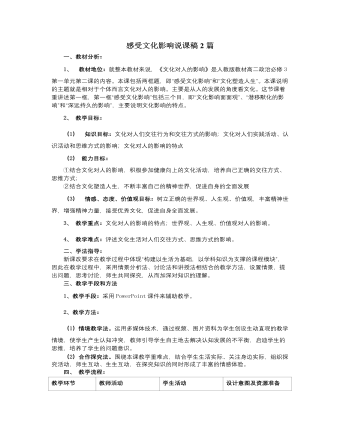
人教版高中政治必修3感受文化影响说课稿2篇
3、问题设计:文化除了影响人们的交往行为和交往方式外,还影响人们的什么?4、师生总结得出结论:文化影响人们的实践活动、认识活动和思维方式。设计意图:通过主题的指引,让学生查阅并说说中国传统节日的来源、传说和意义。这是基于丰富课程资源的设计,将生活和学习领域的多种资源纳入课程的范畴,在活动中自主建构知识,并在教师的引导下,提高分析和解决问题能力,培养热爱祖国的思想感情,突破本框题第二个重点。过渡设问:文化对人影响有什么特点?设计意图:通过问题提示,集中学生的注意力,导入下一个环节的教学。环节三:文化对人潜移默化的影响。教案:1、多媒体播放“孟母三迁”故事动画片。2、讨论问题:“孟母三迁”的故事给我们什么启示?3、师生总结得出结论:文化对人具有潜移默化的影响。设计意图:“孟母三迁”的故事学生比较熟悉,而且这个故事的思想教育性较强。





















